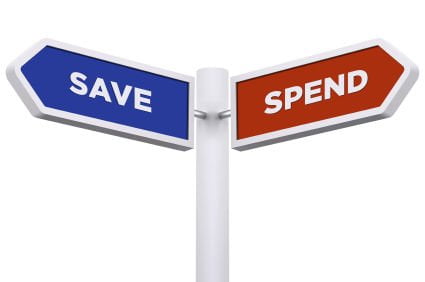If you’re struggling with credit card debt and are also working hard on preserving that emergency savings account, you may be wondering if you should switch gears and choose one over the other.
Prioritizing your bills is always a good idea, but you need to determine whether the benefits of paying down debt faster really are better than building up a savings fund.
In pure financial terms, focusing on paying off high-interest debt and then shifting towards saving is typically the more economically prudent path. After all, your credit card debts may be costing you 10% to 20% in annual interest charges. Meanwhile, your savings are probably only generating about 1% or so in interest.
Before you think rush to liquidate your savings in favor of reducing debt, however, it’s wise to know that most consumers actually fare better doing both: paying off debt while simultaneously building savings.
The way to do it is to take a portion of your income or savings for each goal: use some cash to pay off debt, and use some funds to grow your savings. Don’t wipe out your savings entirely. And don’t feel like you have to completely eliminate every single credit card obligation if it means you’ll be totally cash strapped.
Regardless of which you choose first, or how you opt to handle both goals, here are some tips for handling the savings vs. debt payoff dilemma:
Reasons to Pay Off Debt First:
- You want to lower your monthly payments quickly. Paying off high-interest debts will reduce your overall monthly payments, which frees up more cash for savings and other expenditures. If you’re looking for the fastest way to free up some cash, you’ll want to pay off debt as quickly as possible.
- You need to boost your credit score. If you’re planning to buy a home in the near future or apply for a loan, you’ll need to have a solid credit score. Accumulating savings won’t do much for convincing lenders that you should get a low-interest loan (unless you’re using the cash to reduce your loan amount). Shed some debt to give your credit score a boost, and you could end up with a much better interest rate for that long-term loan.
- Avoid interest rate hikes. If you’re holding on to a balance that was subject to a promotional offer or a zero-interest rate offer a while back, it might be incurring much more interest the longer you carry it. Pay off that debt quickly so you aren’t paying excessive amounts in interest.
Reasons to Save First:
- You can realistically save up enough money to wipe out debt within a year. If you can see yourself paying off your entire debt load with a certain amount of savings within a year, focus all your efforts on saving up that money and make just the minimum payments for now. Depending on the debt load, one years’ worth of interest might be a small price to pay for having all that debt cleared by year’s end.
- You want to preserve your emergency fund. If you feel more comfortable knowing you have a stash of cash available for emergencies, you’ll be better off saving before making big payments before debts. Nobody ever regretted having “extra” cash laying around to deal with the unexpected.
- You need access to cash. If you want your money to be accessible when moving to a new home, traveling or investing in a business, you may want to delay those big debt payments for a while. As long as you can foresee saving up a large amount to pay off that debt in its entirety in the near future, you can focus your efforts on saving and enjoy the peace of mind knowing you have access to your cash. Remember that your savings account is still one of your assets.
Of course, as mentioned, you could realistically do both and really get yourself ahead financially.
This can sometimes be tricky, but all you need to do is keeping paying your debts and then start to look at your savings as an “expense” as well. Include a savings component in your budget and then allocate a portion of your income toward savings, treating it as if it’s just as important as any other monthly obligation you must make.
And when you think about it, this is what the phrase “pay yourself first” is all about.








